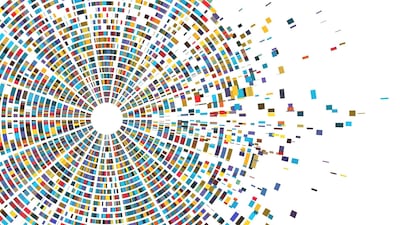Few scientific advances have had an impact on modern day medicine as the sequencing of the human genome in 2003 has had. Before modern genomics, as the study of genes is known, many diseases were known to be hereditary, but precisely who would bear the burden of inheriting them was a challenging question. Mapping out the entirety of the human genome has made it increasingly possible to ascertain an individual’s susceptibility to specific diseases beforehand, giving rise to more accurate diagnoses and better treatments.
Public officials in the UAE this week encouraged Emirati nationals to volunteer anonymous blood samples to provide more data to the Emirati Genome Programme, a project launched last year with the aim of building a repository of genomic data for the local population. The programme has already collected thousands of samples.
Although the overwhelming majority of genes are shared across populations, any two copies of the human genome tend to differ from each other by about 0.1 per cent. The variations, known as polymorphisms, are the product of chance mutations naturally selected over human history. It is no surprise, then, that many are commonly found in specific population groups with a shared genetic ancestry. The diversity of polymorphisms, and the mingling of population groups, has been instrumental to maintaining our species’ health over the course of history. But it is also responsible for the wide array of health conditions that plague us.

As researchers seek to use genomics better to understand disease, accessing as wide a sampling of genomes from as many population groups as possible is critical. To find these, they look to publicly available databases of studies on links between population groups' genes and various diseases, known as genome-wide association studies (GWAS). The most prominent is the GWAS Catalogue, published jointly by the US National Human Genome Research Institute and the European Bioinformatics Institute. Genetic diversity may be the key to healthy human evolution, but diversity in gene sampling is the key to healthy genetic science. And that is an area in which the global scientific community is falling behind, with the consequences felt particularly acutely in the Arab world.
In 2009, 96 per cent of the 1.7 million genome samples available through GWAS were taken from people of white, European ancestry. Virtually none of them were from people of Arab descent. By 2016, with the advent of GWAS in East Asian countries, the number of available samples skyrocketed to 35m, and the representation of white people declined, to 81 per cent. But samples from Arabs and Middle Eastern people constituted a mere 0.08 per cent of those available. And although by 2020 the GWAS Catalogue shows nearly 436m available samples, the proportion of Arab and Middle Eastern ones diminish considerably, to 0.01 per cent.
It is a situation Dr Habiba AlSafar, an Emirati geneticist at Khalifa University, has described as “intolerable”. The lack of available data from population groups in the Middle East is, in part, the product of more money and attention being given to other groups in places where genetic science has traditionally been more advanced – namely, the West and East Asia. But it is also the result of a plethora of geopolitical obstacles, such as weak scientific institutions, economic crises and war in many countries of the region. The consequence is less available knowledge on the links between genes and disease for the region’s people.
The worst of these obstacles are absent in the Gulf, where the Emirati Genome Programme and others like it in neighbouring states offer a rare opportunity to kick-start efforts to better understand Arab genomes. Should they prove successful, they could also serve as a role model for other countries in the region, and a springboard from which to inspire confidence in genetic research. Eventually, they may help close the global data gap, giving the discipline of genomics some much-needed diversity.


